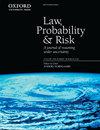Decision-theoretic and risk-based approaches to naked statistical evidence: some consequences and challenges
IF 1.4
4区 社会学
Q1 LAW
引用次数: 1
Abstract
In the debate about the legal value of naked statistical evidence, Di Bello argues that (1) the likelihood ratio of such evidence is unknown, (2) the decision-theoretic considerations indicate that a conviction based on such evidence is unacceptable when expected utility maximization is combined with fairness constraints, and (3) the risk of mistaken conviction based on such evidence cannot be evaluated and is potentially too high. We argue that Di Bello's argument for (1) works in a rather narrow context, and that (1) is not exactly in line with the way expert witnesses are required to formulate their opinions. Consequently, Di Bello's argument for (2), which assumes (1), does not apply uniformly to all convictions based on naked evidence. Moreover, if Di Bello's analysis is correct, it applies also to eyewitness testimony, given empirical results about its quality, and so the distinctions drawn by DiBello cut across the distinction between naked statistical evidence and other types of evidence. Finally, if we weaken the rather strong requirement of precise measurability of the risk of mistaken conviction, to the availability of reasonable but imprecise and fallible estimates, many field and empirical studies show that often the risk of mistaken conviction based on naked statistical evidence can be estimated to a similar extent as the risk of mistaken conviction based on any other sort of evidence.赤裸裸的统计证据的决策理论和基于风险的方法:一些后果和挑战
在关于赤裸裸的统计证据的法律价值的争论中,Di Bello认为:(1)这种证据的似然比是未知的;(2)决策理论的考虑表明,当期望效用最大化与公平约束相结合时,基于这种证据的定罪是不可接受的;(3)基于这种证据的错误定罪的风险无法评估,并且可能过高。我们认为,Di Bello对第(1)项的论证适用于相当狭窄的背景,并且第(1)项并不完全符合要求专家证人表述其意见的方式。因此,Di Bello对(2)的论证,即假设(1)的论证,并不能统一地适用于所有基于赤裸裸证据的定罪。此外,如果DiBello的分析是正确的,那么它也适用于目击者的证词,考虑到其质量的经验结果,因此DiBello得出的区别跨越了赤裸裸的统计证据和其他类型证据之间的区别。最后,如果我们将错误定罪风险的精确可测量性这一相当强烈的要求削弱到合理但不精确和不可靠的估计的可用性,许多实地和实证研究表明,基于纯粹统计证据的错误定罪风险通常可以估计到与基于任何其他类型证据的错误定罪风险相似的程度。
本文章由计算机程序翻译,如有差异,请以英文原文为准。
求助全文
约1分钟内获得全文
求助全文
来源期刊

Law Probability & Risk
MATHEMATICSSTATISTICS & PROBABILITY&-STATISTICS & PROBABILITY
CiteScore
2.10
自引率
28.60%
发文量
8
期刊介绍:
Law, Probability & Risk is a fully refereed journal which publishes papers dealing with topics on the interface of law and probabilistic reasoning. These are interpreted broadly to include aspects relevant to the interpretation of scientific evidence, the assessment of uncertainty and the assessment of risk. The readership includes academic lawyers, mathematicians, statisticians and social scientists with interests in quantitative reasoning.
The primary objective of the journal is to cover issues in law, which have a scientific element, with an emphasis on statistical and probabilistic issues and the assessment of risk.
Examples of topics which may be covered include communications law, computers and the law, environmental law, law and medicine, regulatory law for science and technology, identification problems (such as DNA but including other materials), sampling issues (drugs, computer pornography, fraud), offender profiling, credit scoring, risk assessment, the role of statistics and probability in drafting legislation, the assessment of competing theories of evidence (possibly with a view to forming an optimal combination of them). In addition, a whole new area is emerging in the application of computers to medicine and other safety-critical areas. New legislation is required to define the responsibility of computer experts who develop software for tackling these safety-critical problems.
 求助内容:
求助内容: 应助结果提醒方式:
应助结果提醒方式:


